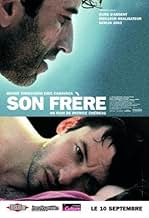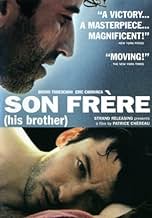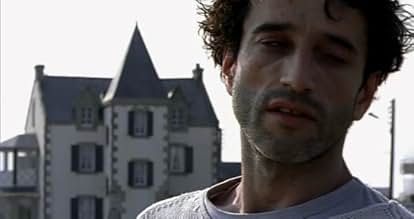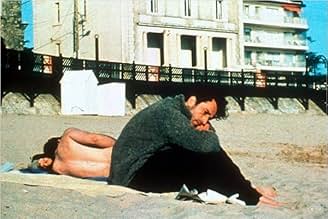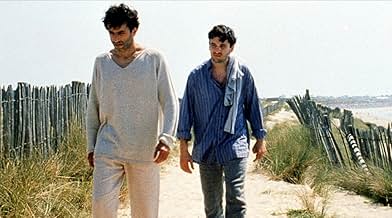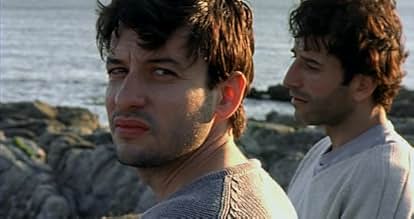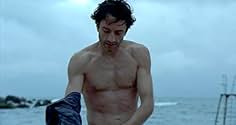Two brothers with a problematic relationship in the past, find together again when the elder one gets a dangerous disease and asks his brother to accompany him to several doctors.Two brothers with a problematic relationship in the past, find together again when the elder one gets a dangerous disease and asks his brother to accompany him to several doctors.Two brothers with a problematic relationship in the past, find together again when the elder one gets a dangerous disease and asks his brother to accompany him to several doctors.
- Director
- Writers
- Stars
- Awards
- 2 wins & 4 nominations total
- Director
- Writers
- All cast & crew
- Production, box office & more at IMDbPro
Featured reviews
If you know Chéreau mainly by his version of Alexander Dumas' novel La Reine Margot or maybe even more famous adaptation of Hanif Kureishi's Intimacy, get ready for something very different. His brother is not history based, there are no mass scenes or attractive dissolute individuals, there are no explicate sex scenes, only delicate human story of illness demystification, complicated family relationships and about love in general. You need patience, compassion and strong stomach for this film. About two thirds of the audience left the cinema before the end. I did not even think about it. I loved it. It was unforgettable. Thomas and Luc are brothers who had lost their closeness long time ago and do not keep in touch until the older one gets strange sickness. Thomas' blood cannot coagulate, doctors are not capable to help, his girlfriend leaves him, his parents argue at his bedside and the only one who stays besides him is his younger brother. Entirely confused and unprepared, in the beginning Luc resists the need to stay with his brother. In a sad hospital surrounding he meets every day a cold doctor, dense nurses and quiet, resigned patients. With no disgust, Chéreau shows plenty of ugly scars, wrinkled skin, hairs, bruises, shiners and burdensome long lasting medical procedures that are not pleasant for sure, but do prepare for death. The sequence where Luc meets nineteen-year old Manuel is astonishing. Gay-oriented man notices Manuel's big eyes and gorgeous lips, still present traces of unusual beauty. During the spontaneous chat with this cut-like-a-piece-of-meet boy full of wounds and scars Luc feels more empathy and warmth than he feels for his own brother. An affecting scene when Manuel's and Luc's hands touch will later repeat with Thomas, when closeness they used to have in their childhood is re-established between two brothers. Retrospectively mixed events unavoidably lead to the fact they are left all alone, with no partners and parents, aware of inescapable death. The act of dying will not be shown so there will be no real cathartic discharge. The right song used at the right place provokes so appalling shudders that every future listening to the same song will surely bring them back. The bitter voice of Marianne Faithful in "Sleep" from her album "A secret life", the song so beautiful and so sad conjures the climax up. This is where the soundtrack starts and ends. Ashes to ashes, dust to dust, as the song says.
I saw Son Frere recently in Montreal in the original French (no subtitles). It certainly was a "brooding" dark film that really concentrated on closeups and detail in the European tradition. For me, the changes in time and settings did not take away from the relationship theme of the two brothers and their gradual reconciliation. I thought the detailed hospital scenes were a bit long but very realistic, though sombre. Ironically, I did not find the film depressing as it gave hope that something good comes in times of crisis. I will remember the film more for the two main actors, who I think were very well cast in these roles. It was more like watching a play or "the real thing" with long moments of silence or little spoken to reflect. Not a film that may have "mass appeal" but worthwhile seeing and memorable.
Director Patrice Chereau, famous for many great films, made this movie. This, of course, let me hope that I would see a good film, at least. But no, this one is not. It is a slow film, and boring.
Two brothers with a problematic relationship in the past, find together again when the elder one gets a dangerous disease and asks his brother to accompany him to several doctors.
So far, so good: This could have been a typical French film about relationships. This could have been a sad tragedy, watching the one brother getting ill. This could have been a good movie, after all, because the acting is really good. But, I can only repeat: This is a boring, slow, far too long picture. The script is poor, and the directing uninspired. Very disappointing.
Two brothers with a problematic relationship in the past, find together again when the elder one gets a dangerous disease and asks his brother to accompany him to several doctors.
So far, so good: This could have been a typical French film about relationships. This could have been a sad tragedy, watching the one brother getting ill. This could have been a good movie, after all, because the acting is really good. But, I can only repeat: This is a boring, slow, far too long picture. The script is poor, and the directing uninspired. Very disappointing.
A film about death. and brotherhood. and the fight against yourself. and need of the other. and about forms of hope. all simple reflections of interior fights and profound intimacy, about fear and need to be near the other who represents, in real sense, part from yourself. a film as testimony about the genius of a great director. and about subtle, precise, touching acting. because it is one of the films with basic status as mirror for states of soul. the story as pretext for deep honesty. poetic. and cruel.
The other like part of yourself. Shadows of past and a fragile present. Fear, emotions and long expectation. And the pain like moral mirror.
A meditation-film. Beach, sea and a hospital. Blood-sick and an ambiguous form of love. Questions, illusions, slices of hate and way of survive. A strange passing and subtle exploration of relation between brothers.
Depressing images and circles of freedom. Nooks of gestures and aspects of reality like symbols of fiction. Compasion like only instrument to define the rules of strange and cold universes. And colors of sentiments essence.
The end of film marks the last words of a subtle poem. The shadow of ataraxia after a long trip, taste of peace after a terrible fight, touch of new images and possibilities after a powerful interior tempest.
A meditation-film. Beach, sea and a hospital. Blood-sick and an ambiguous form of love. Questions, illusions, slices of hate and way of survive. A strange passing and subtle exploration of relation between brothers.
Depressing images and circles of freedom. Nooks of gestures and aspects of reality like symbols of fiction. Compasion like only instrument to define the rules of strange and cold universes. And colors of sentiments essence.
The end of film marks the last words of a subtle poem. The shadow of ataraxia after a long trip, taste of peace after a terrible fight, touch of new images and possibilities after a powerful interior tempest.
Did you know
- SoundtracksSleep
Performed by Marianne Faithfull
Written by Marianne Faithfull, Frank McGuinness (as Frank McGuiness), Angelo Badalamenti
© ANLON MUSIC Co. (P) 1995 ISLAND RECORDS INC.
Avec l'aimable autorisation de Universal Music Projets Spéciaux
- How long is His Brother?Powered by Alexa
Details
Box office
- Gross US & Canada
- $22,834
- Opening weekend US & Canada
- $6,802
- Apr 4, 2004
- Gross worldwide
- $131,195
- Runtime
- 1h 32m(92 min)
- Color
- Sound mix
- Aspect ratio
- 1.85 : 1
Contribute to this page
Suggest an edit or add missing content

